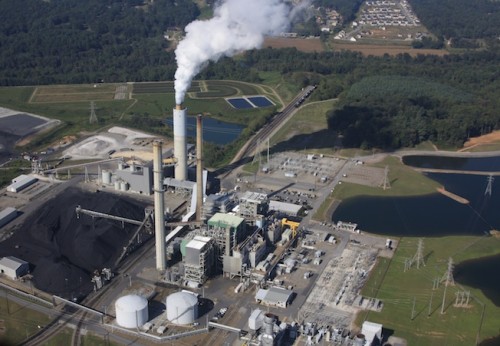Front Porch Blog

Duke Energy plans to retire its Asheville coal plant and build a natural gas-fired facility in its place. The announcement should be celebrated as progress, but it also represents another precarious step toward a future reliant on fossil fuels.
A plan to “end an era of coal” in Asheville and enter an era of natural gas.
In a surprise announcement that some predicted and many have long advocated for, Duke Energy shared plans today to “end an era of coal” in Asheville, N.C., by retiring the coal-fired power plant that sits on the banks of nearby Lake Julian.
The aging power plant, which began operating in 1964, has been a constant target for Appalachian Voices and many of our allies in North Carolina working to address coal ash pollution and promote investments in cleaner energy.
The company plans to spend around $750 million over the next four or five years to retire the coal plant and replace it with a 650-megawatt natural gas-fired power plant, nearly doubling the current plant’s capacity. The plans also include building solar generation on the site, but it’s unclear how large — or small — the size of the renewable portion of the project will be.
While the news should be celebrated as progress, it also represents another precarious step along a dangerous road that will prolong our region’s over-reliance on fossil fuels and saddle consumers with long-lived investments in natural gas.
Duke, more than any other southeastern utility, has been at the forefront of the coal-to-gas fuel-switching trend, retiring seven of its 14 North Carolina coal plants in the past five years. The utility is also slated to be the largest customer of the proposed 550-mile Atlantic Coast Pipeline, but, in this case, plans to upgrade an existing natural gas pipeline to supply the new plant.
Even though the company has brought on large-scale solar projects in recent years, Duke’s enthusiasm for clean energy doesn’t come close to its eagerness to expand natural gas generation and infrastructure. That fact is reflected in the mixed responses of environmental groups and clean energy advocates to today’s news.
“The retirement of the Asheville Plant is a step in the right direction, but it is a half measure, undermined by continuing reliance on an economically unpredictable and polluting source of power. Duke can do better, and our community deserves better,” a coalition of groups made up of MountainTrue, Sierra Club, Southern Environmental Law Center and Waterkeeper Alliance announced in a joint statement. “We will continue to use every tool at our disposal to fight for clean energy solutions for Western North Carolina.”
According to Duke, electricity demand in the Asheville area has doubled over the past forty years and the Asheville plant is a “must run” facility, meaning it operates around the clock to maintain reliability. But data charted by SNL Energy shows the plant’s capacity factor has been trending down since 2010, likely due to new capacity at the more-economical Cliffside power plant coming online.
Closing the plant will dramatically reduce harmful emissions of sulfur dioxide and mercury, and the new natural gas plant will emit about 60 percent less carbon dioxide per-megawatt hour. But its larger generating capacity could mean overall carbon emissions stay about the same.
The cost of retrofitting the plant’s coal ash ponds to comply with the state’s Coal Ash Management Act is sure to have played a role in the decision to retire the plant. The N.C. Department of Environment and Natural Resources also cited Duke in February for contaminating groundwater at the facility, which could lead to fines.
The Asheville plant is the only facility out of the four deemed “high priority” by the coal ash law that still burns coal. It is also one of the few still-operating plants involved in the federal lawsuit over coal ash pollution that led Duke to plead guilty to nine misdemeanors under the Clean Water Act.
The case for closing the Asheville coal plant is clear. But Duke must do more to meet its promises to North Carolinians. At a time of tremendous opportunity to expand clean energy, America’s largest electric utility has the obligation and more than enough influence to lead.
PREVIOUS
NEXT
Related News

Leave a comment
Your email address will not be published. Required fields are marked *
One response to “Duke Energy to close aging Asheville coal plant”
-
GOOD! They need to close all of them down!

Leave a Comment